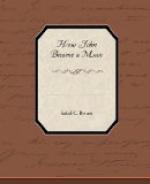VI “Effects of alcohol upon the brain and nerves are:
“(a) It causes apoplexy and epilepsy by confusing the brain.
“(b) It weakens the will and deadens the feelings.
“(c) It hardens the brain tissues,
producing dullness, insensibility,
and insanity.
“(d) It destroys the nerve fiber of the brain.
“(e) It temporarily stimulates and finally depresses this organ.
“(f) It will at last destroy man, body and soul.”
“Alcohol leads every other drug in its far-reaching influence for mischief and evil. Were the thousands of ruined homes, the untold numbers of blasted lives, the sorrows, the sins, numberless crimes, murders, and deaths brought in panoramic review before us, what a hell-born picture it would be!”
“The effect of alcohol upon the morals is awful. All delicacy, courtesy, and self-respect are gone; the sense of justice and right is faint or quite extinct. There is no vice into which the victim of drunkenness does not easily slide; and no crime from which he can be expected to refrain. Between this condition and insanity there is but a single step.”
These are only a part of the many evils that come to the one who takes alcohol into his system. We have already heard something about the effects of nicotine, the poison that is in tobacco. The constant use of either poison will impair the health of the strongest person. It saps the mind of its reasoning qualities; and in nine cases out of ten, leaves the victim without sufficient strength to seek and obtain his own deliverance or to live a righteous life. But let us return now to John.
CHAPTER IX
Caught Unawares
At the age of eighteen John had come almost to the point of discouragement. His health was so poor that he did not know a well moment; and besides, his longing soul was still unsatisfied. He had always desired to be good and kind to all; but he did not know how to rise to a nobler plane of conduct than that on which he was living. He judged men by their moral conduct, and not by their spiritual life. In fact, he had very little, if any, comprehension of Christianity. He knew of a few, like Farmer Z., who professed religion; but he was afraid of these and he avoided their company.
He had now and then, with a number of other boys about his own age, visited some places where religious services were being held. But their object in going was to have a good time; and they seldom remained long enough to derive any good. On one of these occasions they went to a small school house that was located a few miles from the town of C. The meeting had been widely advertised, and a goodly number were in attendance; and when John and his companions had taken their seats well to the rear, there was only standing-room left. Curiosity was pictured on every face; for the ministers (one elderly, the other young) were two modestly dressed women, and lady preachers had never been heard of in that part of the country.




